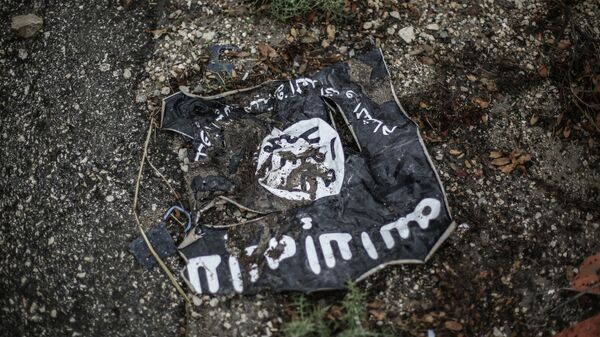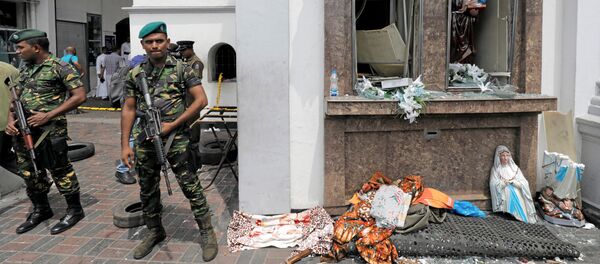Sputnik has discussed the issue with Robinder Sachdev, political analyst and founder president of The Imagindia Institute Independent think-tank.
Sputnik: What is the chance that the group can succeed in establishing a new caliphate in the region?
Robinder Sachdev: The chance of Daesh being able to establish any such "province" in India is zero. It is pure propaganda to raise its own profile.
However what has to be noted is that social media and the dark web has become a powerful tool for propaganda and inspiring extremist thought and violence, including in India.
Sputnik: What can be the consequences?
Robinder Sachdev: It is for the first time that Daesh has specifically referred to its ambition of creating a province in India. Prior to this, since about 2015, Daesh has referred to the Af-Pak region, and Kashmir, jointly.
This statement is the first time it has referred to a specific "caliphate" in India. This indicates it might now design its terror activities in India with a increased focus.
This also means that it will enhance its propaganda for "Wilayah of Hind", and may take credit for some extremist activities in India which may not even be related or organized by it — in order to increase its visibility and attempts to recruit followers.
Though given the objectives that it promotes, Daesh may attempt its nefarious activities anywhere in India, but probably it will focus more on Kashmir.
Sputnik: Does it mean that Daesh is eyeing Asia as its possible future foothold?
Robinder Sachdev: Coming soon after the Sri Lanka attacks, this move certainly shows that Daesh is trying to build it profile and foothold in the sub-continent, and Asia.
It seems to have been encouraged to spread its footprint in Asia upon realizing that several of the fighters that went to the Middle-East were from some of the Asian countries, and the returnees among them have given it a core network with which to ignite chaos in the countries where they have returned.
Also, the intelligence and internal security regime in many of the smaller Asian countries is weak, which can make some of them soft targets — as seen in Sri Lanka.
Sputnik: What steps could we expect from India?
Robinder Sachdev: India will take very strong steps in response to this development. This claim by Daesh is a game-changer on how the Indian security agencies will assess their response. Hitherto India has been battling terrorism in Kashmir that was inspired and supported by organizations in Pakistan, who take advantage of the discontent in Kashmir.
India is in midst of parliamentary elections right now, and the new government will take office on 23 May. An immediate focus on this development will be one of the first steps of the new government.
One of the other steps that India is taking already, and which will be pursued with even more urgency, is to smoke out any links that any of the perpetrators of the Sri Lanka blasts last month had with India.
There are reports that some of them travelled to India, for some trainings or some coordination, as some reports have suggested.
Sputnik: What can be India's long-term strategy in fighting Daesh on its territory, taking into account that the province of Kashmir has been vulnerable to internal and external threats, including militant attacks?
Robinder Sachdev: India's long term strategy in Kashmir is three-fold.
One, is to stop cross-border infiltration from Pakistan based terror groups; two, to eliminate those who take up violence inside India; and, three, to work towards winning the hearts and minds of people in Kashmir. That will remain the overall strategy with Kashmir.
However, with Daesh, the strategy will be a single-point — seek and destroy.
This obviously means better intelligence gathering — both technical, as well as on the ground, including policing, and informer networks, and a dedicated approach to pre-empting any scope for Daesh to foster terrorism anywhere in India.
Sputnik: What is the possbility of India and Pakistan cooperating in solving this issue?
Robinder Sachdev: At present this possibility is very low. With Pakistan, India is determined to first block the existing players and terror groups that interfere in India.
There has been some success on that — especially due to international pressure on Pakistan, and Pakistan's economic crisis due to which Pakistan government and military are being forced to mend their ways, plus with the warnings by the FATF (Financial Action Task Force).
This itself is a long road. Unless Pakistan gives up direct or indirect support to militants who are bent upon harming India, it will be naive to expect any cooperation.
With the US withdrawing from Afghanistan, Pakistan is trying to again leverage a favourable position for itself, plus if it gets the economic bailout from IMF, then again the pressure on Pakistan to reform will be less, and it may go back to its old ways, and then any progress on curbing terrorism will be back to square one.
The only hope for India is that there will be some point of time, a tipping point for Pakistan, when its military and civil leadership will realize the cost-benefit of curbing terrorism inside its own country, and better relations with India.
Sputnik: How do you assess the risk of Daesh extending its claims to bordering territories? What countries are under the threat?
Robinder Sachdev: There is a moderate level of risk that Daesh can create mischief in bordering areas in the sub-continent, no doubt. But as far its "claims" on territories, of that there is low risk.
In the subcontinent, all countries are under threat — Afghanistan, Pakistan, Bangladesh, Myanmar, Sri Lanka, and even in India. If any country most at risk where Daesh could in fact claim a territory, then it would be Afghanistan and Pakistan.
In other countries the risk is of militancy, violence, but not control of any territory. The challenge is also for all countries to have strong borders — otherwise, if smuggling of arms or militants cross over the borders and wreak violence into a neighbouring country often the host country may overlook or neglect to curb those militants because they are not harming its own interests (or maybe serving some of its oblique objectives).
Sputnik: If so, who would bear responsibility for tackling the threat?
Robinder Sachdev: The responsibility for tackling the threat lies primarily with each country. More so with the policing, intelligence and security agencies.
Though in Afghanistan and Pakistan the responsibility lies also with their military forces. The Daesh threat can be tackled only from a security perspective.
Political solutions have no answer to the ideology that Daesh promotes.
Sputnik: What can be the international community's reaction?
Robinder Sachdev: The international community's reaction may not be much to write home about. But the international community has to increase its cooperation and become much more proactive in rooting out this scourge.
Plus, most important — the international community should not sit back now that the core territory of Daesh has been unlocked, but must continue even harder to eliminate the leadership actors and the distributed foot soldiers of Daesh who are melting into civic society in the Middle-East and other countries.
There should be an urgent global manhunt to capture and bring to justice everyone who has participated in the mayhem in Middle-East. Lastly, the international community must share lessons learnt so far in tackling Daesh in the Middle-East.
Views and opinions expressed in this article are those of Robinder Sachdev and do not necessarily reflect those of Sputnik.
*Daesh (also known as ISIS/ISIL/IS) is a terrorist organisation outlawed in Russia and many other countries.






